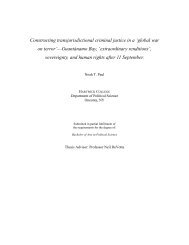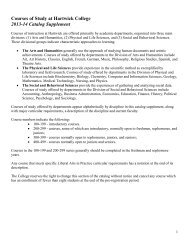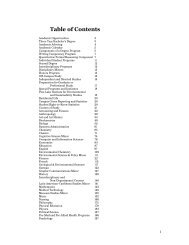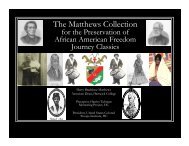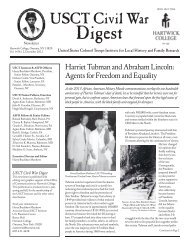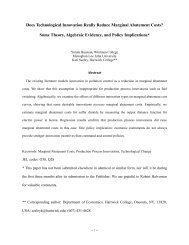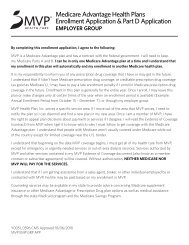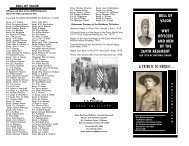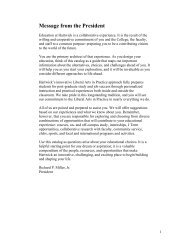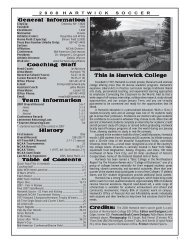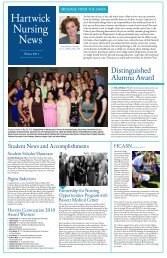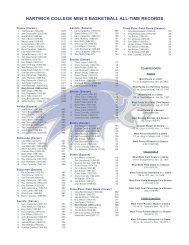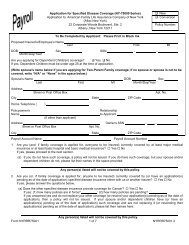Table of Contents - Hartwick College
Table of Contents - Hartwick College
Table of Contents - Hartwick College
You also want an ePaper? Increase the reach of your titles
YUMPU automatically turns print PDFs into web optimized ePapers that Google loves.
organizations. Also required are three introductory courses concerning<br />
the vocabulary and structure <strong>of</strong> the business world, Econ 250-259 as well<br />
as Acco 141 and 142. It is recommended that these three courses be taken<br />
in the first and second years at <strong>Hartwick</strong>.<br />
In the junior year and senior year semesters students learn the following<br />
traditional management functions, using organizational behavior and<br />
accounting principles learned earlier: finance, human resources,<br />
international management, marketing, policy and strategy,<br />
entrepreneurship, and service organization operations. In addition,<br />
students will deal with leadership, team building and decision making;<br />
computer and information management issues; presentation and<br />
communication skills; and ethical dimensions <strong>of</strong> business situations.<br />
<strong>Hartwick</strong> <strong>of</strong>fers a dual degree program with Clarkson University and<br />
Union University, where students earn a B.A. from <strong>Hartwick</strong> and an<br />
M.B.A. or M.S. from Clarkson or Union.<br />
Faculty<br />
Thomas G. Sears, chair; John K. Clemens; Scott J. Dalrymple; Stephen A.<br />
Kolenda; Gregory J. Starheim; Priscilla Z. Wightman; Katrina A. Zalatan<br />
Courses<br />
261 Introduction to Business (4 credits) Analysis <strong>of</strong> behavior within<br />
the organization. Introduction to concepts <strong>of</strong> goal setting, structure and<br />
decision making. Examination <strong>of</strong> conflict, motivation, communication,<br />
team building and leadership theories. Organizational, interpersonal and<br />
personal dimensions <strong>of</strong> behavior will be examined through readings,<br />
cases, and running a small business in a simulated industry. No<br />
prerequisite. (SBA)<br />
340 Marketing (3 credits) Students assume the role <strong>of</strong> a product<br />
manager, responsible for marketing multiple products. Students learn<br />
and apply basic marketing principles and statistical, financial and<br />
economic analyses to design and market their products to meet customer<br />
needs and ultimately achieve target market share, revenue and pr<strong>of</strong>it<br />
objectives. Prerequisites: At least a C in Busa 261 and junior standing.<br />
341 Service Industries (3 credits) Students assume the role <strong>of</strong> general<br />
managers responsible for a company in a service industry. Students<br />
integrate basic finance, operations, human resource management and<br />
marketing concepts to achieve planned service delivery and pr<strong>of</strong>it<br />
objectives. Industry analysis, demand forecasting, capital budgeting, and<br />
strategic planning concepts also are emphasized. Prerequisite: At least a C<br />
in Busa 261 and junior standing.<br />
380 Finance (3 credits) Students assume the role <strong>of</strong> financial managers.<br />
Financing and investing activities are investigated with emphasis on<br />
learning the tools and techniques <strong>of</strong> this function. Building on the<br />
accounting and economics backgrounds <strong>of</strong> students, this course focuses<br />
on their properly making decisions based on quantitative analysis.<br />
Prerequisites: Busa 341 and Acco 142.<br />
381 Human Resources (3 credits) Students assume the role <strong>of</strong> human<br />
resource managers responsible for creating, implementing and critically<br />
69



